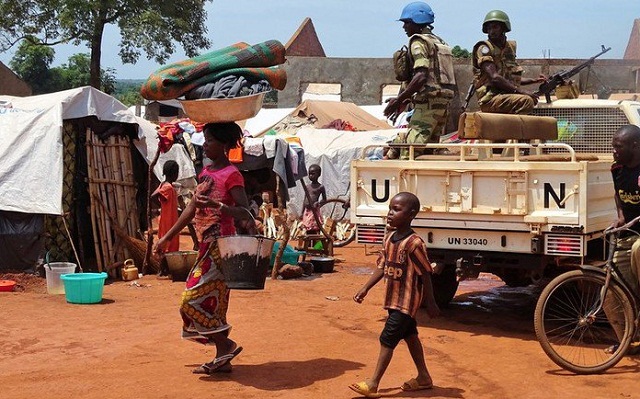
Libreville, Gabon | AFP | Civilians in a central province of the strife-torn Central African Republic are enduring “a horrifying surge in torture, pillage and forced displacement”, Amnesty International reported Friday.
“Women have been raped, men murdered, villages destroyed, and the region’s UN peacekeeping force has proved ineffective in stemming these abuses,” Joanne Mariner, the rights group’s senior crisis response adviser, said in a statement.
Amnesty blamed “a wave of brutal attacks” in Basse-Kotto province on the Union for Peace in the Central African Republic (UPC), an armed offshoot of the mainly Muslim Seleka rebel alliance that seized power in 2013 and installed a regime that lasted 10 months.
The UPC is led by local warlord Ali Darassa, who is close to Fula nomads based in the Alindao region of Basse-Kotto, about 300 kilometres (185 miles) from the capital Bangui, where a degree of normalcy has been restored with foreign help.
During a two-week mission on the ground in August, Amnesty gathered 30 eyewitness accounts of recent violence, including one from Annie, aged 36.
“We’re going to do something to you Christians that won’t be forgotten for many generations,” Annie quoted one attacker as saying. Her husband was shot in the legs when he tried to flee.
#CARCrisis: Fresh wave of atrocities highlights need for stronger @UN_CAR action to protect civilians https://t.co/yN996TErfe pic.twitter.com/1W1bwV3wh4
— AmnestyInternational (@amnesty) September 8, 2017
“After raping my husband, he (a fighter) shot him in the head,” said Annie, who was herself raped by another armed man. Both rapes and the killing took place in front of the couple’s five children.
Of 25 women interviewed by Amnesty, 20 said they had been raped.
“The UPC’s use of rape as a weapon of war, and as a means of violently humiliating and degrading its victims, appears to be systematic,” Balkissa Ide Siddo, Amnesty’s Central Africa researcher, said in the report.
Amnesty said it regretted that the UN mission in the deeply poor nation, known as MINUSCA, “has failed to prevent these abuses”, but acknowledged that “the force is stretched thin”.
Contacted by AFP, MINUSCA spokesman Vladimir Monteiro said that “teams have been sent to document the violations”.
A temporary base has been set up in Alindao “to ensure protection for displaced people and facilitate the work of humanitarian personnel,” he added.
Clashes in May claimed several dozen lives in Alindao, then in June about 10 people were slaughtered in a village not far from the town.
United Nations aid chief Stephen O’Brien told the Security Council last month there were early signs of genocide in the deeply poor nation.
Renewed violence among different armed groups has taken place in recent months as they fight to establish zones of influence and gain control of natural resources, which include diamonds, timber and gold.
 The Independent Uganda: You get the Truth we Pay the Price
The Independent Uganda: You get the Truth we Pay the Price





